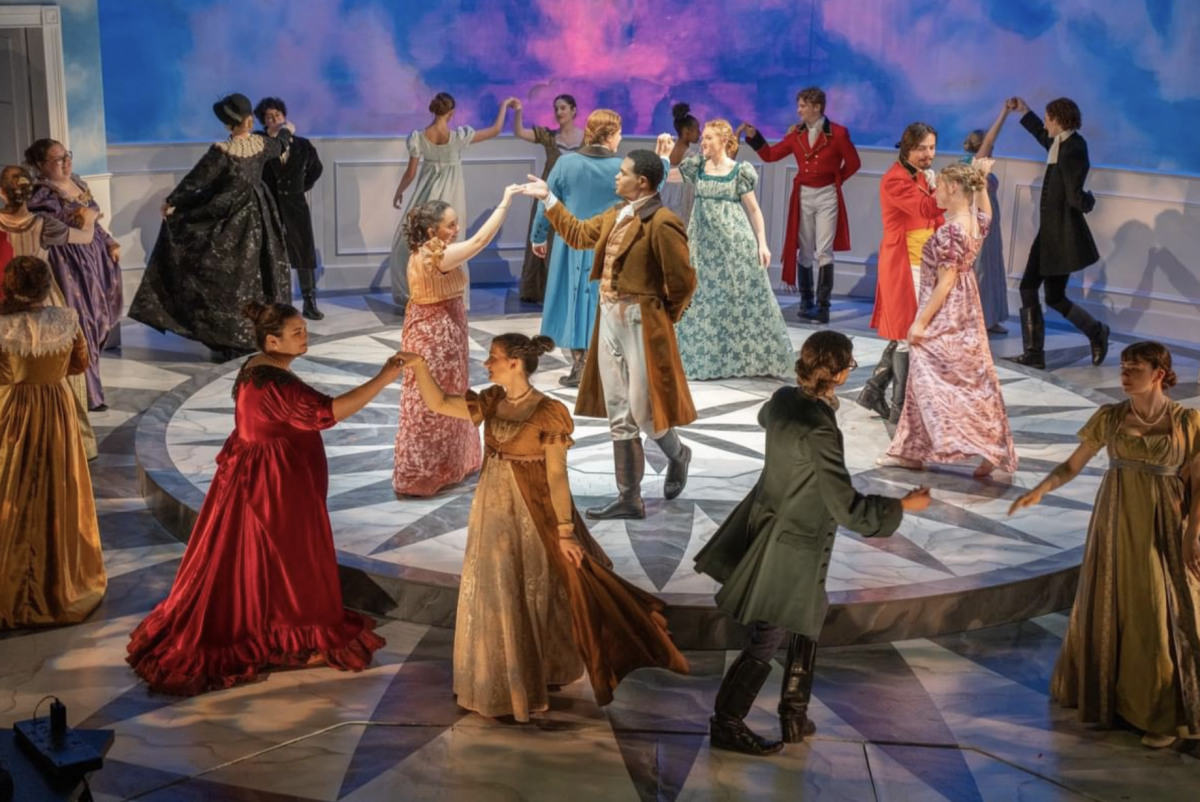Over the course of two weekends from Nov. 7- 17, audiences at the University of Wisconsin Theatre had the chance to fall back into Jane Austen’s masterpiece “Pride and Prejudice.” The play lasted almost three hours, with a 10-minute intermission. The show is a world theatrical premiere, created and adapted for the stage by the department chairs expressly for University Theatre.
“It is a truth universally acknowledged, that a single man in possession of a good fortune, must be in want of a wife,” reads the satirical opening line of Jane Austen’s novel “Pride and Prejudice.”
It is also a truth universally acknowledged that most people have heard this starting line at least once in their lives. And yet, this story continues to dazzle readers and movie-goers alike, inspiring retellings set in any number of worlds — zombies, the modern world and even space.
As soon as the show starts, you’re immediately immersed in Austen’s world. Though the set is minimalist with no more than 10 pieces of furniture on stage at any given time, the energy of the cast is largely felt. Of the female characters, two stand out immediately — Mrs. Bennet and the fearless protagonist, Elizabeth Bennet. They both command attention, though for different reasons. Mrs. Bennet is by definition a comedic character. Her reactions are outsized and hilarious, and she’s often the character that grounds the play in the time period, with her worries and poor nerves. On the other hand, Elizabeth Bennet is more rational, and her reactions to the situations her family finds themselves in often mirror those of the reader or audience members.
One thing is for sure, whenever either of these characters are on stage, every eye is on them. Though this could be a burden, they shoulder it with ease.
The Badger Herald had the chance to sit down with AJ Stoffels, the actress playing Elizabeth Bennet, and talk about how the show came to be.
Stoffels is a sophomore from Oregon, Wis., and in her third production at UW. But, Stoffels said she acted in countless other productions in her hometown.
“When I heard that we were doing Pride and Prejudice this year, I obviously [tried out],” Stoffels said. “You just have to!”
Stoffels, like many others in the cast, has engaged with the text numerous times, and it’s a story many of them hold close to their hearts, she said. The audience shared that love of the source material, and it was obvious when the lights started to dim that there was a hush of anticipation. The show did not disappoint.
It’s hard not to feel everyone’s presence. There are 27 cast members, and sometimes all are on stage. The way they use space and lighting to make a scene feel more intimate, is masterful.
“Being in the show has added another dimension to my experience with the story,” Stoffels said. “It’s now linked to an amazing cast. When I think of Pride and Prejudice, I think of these people and this production.”
Usually, University Theatre productions have less than 20 cast members, but the added members have a benefit in this case as they fill the stage during dance numbers and keep the audience engaged with narration. The narrators function as a middle ground between the audience and the characters, keeping the words of the book prevalent throughout the show.
The narration gave the show a conversational tone, and through creative physical humor, let the audience in on jokes.
Physical humor is something that makes this show unique from any previous adaptation, Stoffels said.
“There’s a lot of breaking the fourth wall, closing it, only to break it again two seconds later,” Stoffels said.
In a theater production, there’s nowhere for actors to hide when they aren’t part of the immediate dialogue as they have to remain on stage. This creates a few hilarious moments, such as when Mr. Collins must stand alone after Elizabeth has refused his offer to dance and runs off to giggle about it with her sister. Though he’s not the focus of the scene anymore, he has to stay in character, so he stands in the corner with an exaggerated frown for the next two minutes.
The audience couldn’t get enough of it. In another moment earlier in the show, Mr. Darcy says something to the effect of “I’ll stay here, by the fire,” only there was no fire on stage, and the actor was aware of this. He looked over his shoulder, and then back at the audience with a conspiratorial smirk, and everyone laughed out loud.
The narrators are especially aware of the distance between them and the protagonists. When Mr. Darcy was awkwardly sitting with Elizabeth, attempting to converse and eventually propose — the first time — the narrarators egged him on with exaggerated “go on” arm motions.
All of these moments add up to what Stoffels calls the ebb and flow of the journey.
“The tension, the hatred that turns into love, it’s a full body, full mind experience to be in the show and on stage for almost the entire runtime,” Stoffels said.
It’s an immersion for the actors just as much as the audience. Stoffels said the performance felt like leaving a piece of her soul up there. I think they knocked it out of the park and would happily look forward to a repeat performance.
UW Theatre and Drama’s next performance will be in February, with a performance of “Joe Turner’s Come and Gone.”








